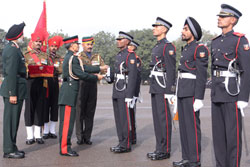 NEPAL ARMY Chief of Army Staff Chhatra Man Singh Gurung is on an official visit to India where he was conferred Honourary Rank of General of Indian Army this week. |
The Joint Secretary of India's external affairs ministry Satish Mehta has decided that an army airstrip at Surkhet and the resumption of non-lethal military supplies are the two most important needs of Nepal. Chief of Army Staff Chhatra Man Singh Gurung is leaving today for India for a week-long visit. For the Indian security establishment, the imperilled peace process of Nepal has suddenly become a low-priority issue. Security cooperation rather than political interactions is going to be the focus of Indo-Nepal relations in the coming days.
These days, few Nepali politicians can access top-rung Indian leaders. They have to go through featherweight politicos like D.P. Tripathi, who was here some time ago to bolster the resolve of the anti-Maoist coalition in Singh Darbar.
Officers of the Nepal Army, however, can boast of high-profile batch mates from Sandhurst, West Point or the Indian Military Academy at Dehradun. General Gurung is an alumnus of the latter and will be attending a graduation ceremony there during his visit, but he will also have a crucial meeting with Prime Minister Manmohan Singh's national security advisor M.K. Narayanan.
Meanwhile, the Chinese sent a team under Gen Shu Yu Tai, its deputy force commander in Tibet, to assess ways of enhancing military assistance. Another Chinese team is likely to arrive soon to discuss the modalities of improving security along the 1400km Nepal-Tibet border, much of which remains impassable throughout the year anyway. The agenda for Premier Madhav Kumar Nepal's scheduled visit to Beijing from December 26 is thus more or less set: there may be some development assistance thrown in to sweeten the deal, but he will be asked to accept security assistance first and foremost.
With friendly neighbours like these competing with each other to militarise the Nepali state, democrats and peaceniks in Nepal need no enemies. But that doesn't mean they don't have to contend with more friendly advice from further afield; everyone seems to have designs for the vulnerable, geopolitically strategic state of Nepal.
The Eurozone is still a marginal player in global affairs, often playing second fiddle to Uncle Sam. But individual European countries wield considerable clout in the capital cities of the Third World, where the academic elite and the INGO/NGO sector are important actors in national politics.
This sector may be naturally more comfortable with the suave social elite than with the rustic political class. The problem arises when opinion leaders begin to play favourites with the transfer and promotion of officers in the Nepal Police or the Nepal Army at the instigation of their sponsors at various aid agencies. Playing politics with the defence establishment is a bigger cause for concern than even militarisation.
Till the early 1960s, the India Desk at the State Department in Washington looked after its interests - meagre as they were back then - in Nepal. With Af-Pak emerging as a global hotspot, the concept of the India Desk may yet see a revival. But if the experiences of the past are anything to go by, there is nothing to cheer in the decision of the Embassy of the United States in Nepal to develop American Centers in four different towns in the country. Intelligence gathering rather than strengthening of democracy will probably be their priority.
It seems Nepalis will have to learn the ropes of democracy on their own. All foreign aid is invariably aimed at strengthening the establishment, of which the military is the most prominent part. Hillary Clinton affirmed this viewpoint by vowing to restore American leadership through a 'smart power' mix of diplomacy and defence at her Senate confirmation as the US Secretary of State earlier this year.
Meanwhile, the queues at the KFC and Pizza Hut outlets, to say nothing of the booming sales of Coke and Pepsi, will ensure that Americans taxpayers needn't worry about the source of funds that go in the name of aid to Nepal.
READ ALSO:
We're with you - FROM ISSUE #481 (18 DEC 2009 - 24 DEC 2009)



